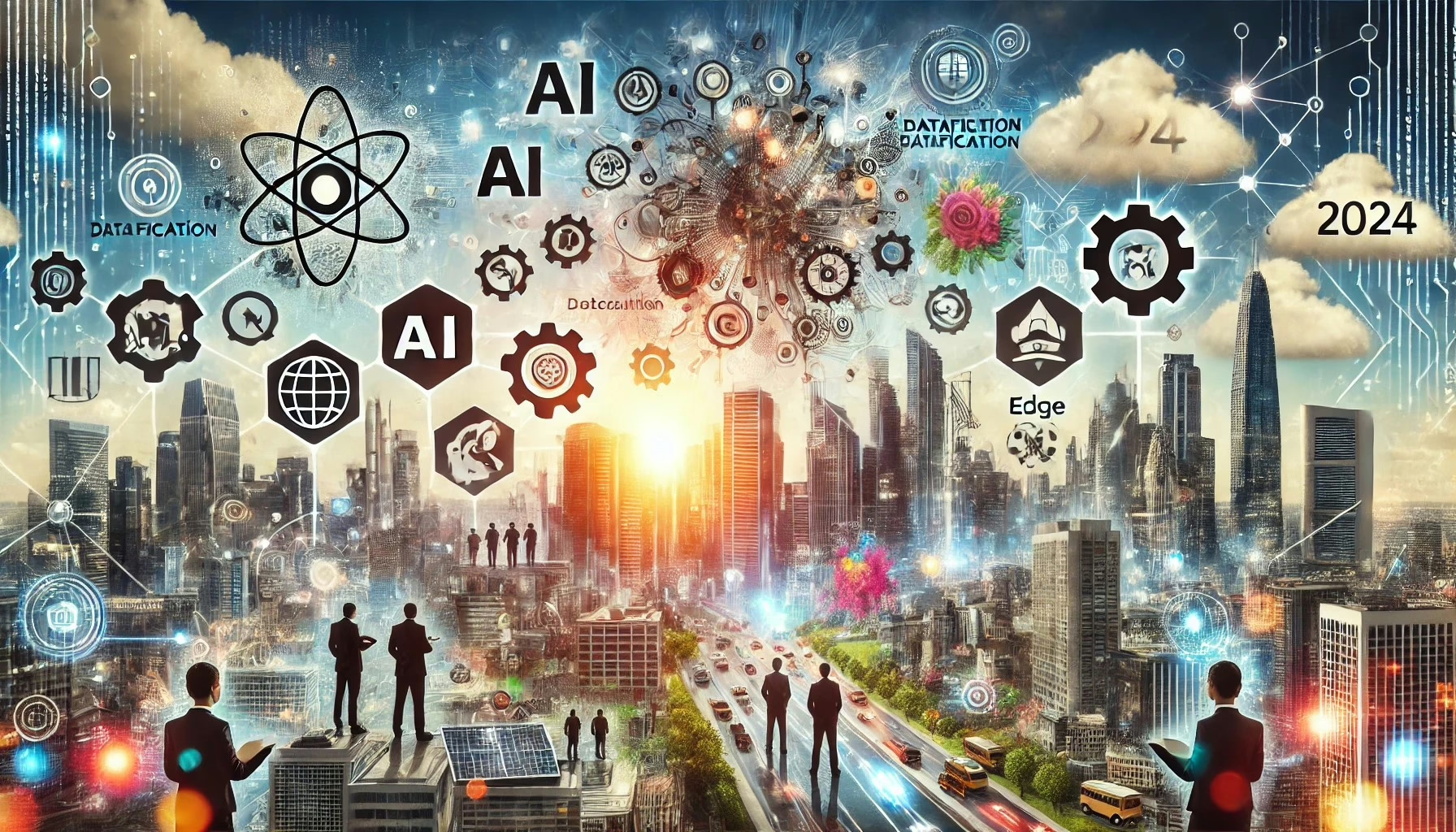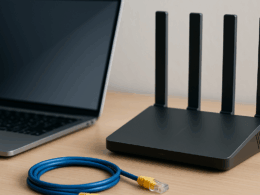Having worked in the IT industry for nearly 30 years, I’ve seen technology evolve from dial-up modems to AI-powered everything. It’s been quite the ride, and the latest trends are no less exciting. So, let’s dive into what’s shaping the tech landscape this year with a touch of humour and a lot of facts.
The Rise of Generative AI
Generative AI is not just another buzzword; it’s transforming how we work and live. From creating new content to automating mundane tasks, generative AI is a game-changer. Imagine having a digital butler that not only schedules your meetings but also drafts your emails and predicts your next great business idea. This is the power of generative AI. Companies are investing heavily in this technology, and it’s paying off. In fact, 86% of UK executives believe that generative AI will compel their organisations to modernise their technology architecture (Accenture | Let there be change).
Generative AI’s applications are vast and growing. It’s being used to create realistic images, write coherent text, and even compose music. This technology is revolutionising industries by increasing efficiencies and enabling new forms of creativity and productivity. For instance, in marketing, generative AI can create personalised content for different audiences, while in healthcare, it can assist in diagnosing diseases by analysing medical data. The possibilities are endless, and the future is bright for generative AI (Deloitte United States) (The UK’s technology trade association).
Datafication: Turning Life into Data
Datafication is the process of turning everyday activities into digital data. From your morning jog tracked by a smartwatch to industrial machines monitored in real-time, data is everywhere. This trend underscores the importance of data security and management. Professionals skilled in data analysis, security, and storage are in high demand, reflecting data’s central role in driving innovation and efficiency (Lucidica).
The pervasive nature of data in modern society means that nearly every aspect of our lives is being quantified and analyzed. This transformation is enabling businesses to make more informed decisions, improve customer experiences, and streamline operations. For example, retailers can track customer behaviour to optimise inventory and marketing strategies, while manufacturers can use data to predict equipment failures and schedule maintenance proactively. As data continues to grow in importance, the need for robust data management and security measures becomes ever more critical (Accenture | Let there be change) (Lucidica).
The Metaverse: Beyond Reality
The metaverse is a vast, interconnected digital universe combining augmented reality (AR) and virtual reality (VR). It offers immersive experiences that blend the physical and digital worlds. Companies are exploring the metaverse for applications in gaming, social networking, education, and healthcare. This digital realm is set to revolutionise how we communicate, collaborate, and entertain ourselves (Lucidica).
In the metaverse, users can create avatars to explore virtual worlds, attend virtual events, and interact with others in ways that were previously impossible. This new frontier is not just for gamers; businesses are also leveraging the metaverse to create virtual workspaces, host conferences, and provide immersive training experiences. The potential applications of the metaverse are vast, and as the technology continues to develop, it will undoubtedly become an integral part of our digital lives (The UK’s technology trade association) (The UK’s technology trade association).
3D Printing: Manufacturing Reimagined
3D printing, also known as additive manufacturing, allows for the creation of three-dimensional objects layer by layer. This technology is making waves in various fields, from healthcare, where it’s used to produce custom prosthetics, to aerospace, where it creates lightweight components. The ability to produce complex and customised designs with minimal waste is revolutionising manufacturing (Lucidica).
The versatility of 3D printing means it can be used to create everything from simple tools to intricate components for high-tech industries. This technology is enabling rapid prototyping, reducing production costs, and allowing for greater customisation. In the healthcare sector, for example, 3D printing is being used to create patient-specific implants and prosthetics, improving outcomes and reducing recovery times. As the technology continues to evolve, its applications will only expand, making it a key player in the future of manufacturing (Lucidica).
Robotic Process Automation (RPA)
RPA uses software to automate routine business tasks, freeing up employees to focus on more strategic activities. This technology is reshaping the workforce by augmenting human capabilities and driving the need for new skills. While it might sound like the rise of the robots, it’s more about enhancing productivity and job satisfaction (Lucidica).
RPA can handle repetitive tasks such as data entry, invoice processing, and customer service interactions, significantly reducing the time and effort required to complete these activities. This not only improves efficiency but also reduces the likelihood of errors. Furthermore, by automating mundane tasks, RPA allows employees to focus on more creative and strategic work, leading to higher job satisfaction and better business outcomes. The impact of RPA is being felt across industries, from finance to healthcare, making it an essential tool for modern businesses (The UK’s technology trade association) (Accenture | Let there be change).
Blockchain: Beyond Cryptocurrencies
Blockchain technology provides a secure and immutable way to store and manage data. Its decentralised nature makes it resistant to fraud and manipulation, which is why it’s being adopted across various sectors, not just finance. From supply chain management to voting systems, blockchain is revolutionising how we verify and exchange information (Lucidica).
The applications of blockchain extend far beyond cryptocurrencies like Bitcoin. In supply chain management, for example, blockchain can provide transparency and traceability, ensuring that products are ethically sourced and safely delivered. In the healthcare sector, blockchain can be used to securely store patient records, making them accessible to authorised personnel while maintaining privacy and security. The potential of blockchain to transform industries is immense, and as more organisations adopt this technology, its impact will continue to grow (Accenture | Let there be change) (The UK’s technology trade association).
Edge Computing: Data Processing at the Source
Edge computing decentralises data processing by bringing it closer to the data source. This reduces latency and ensures quicker response times, making it ideal for time-sensitive applications like IoT devices and autonomous vehicles. By complementing existing cloud infrastructure, edge computing supports dynamic and distributed computing environments (Lucidica).
As the number of connected devices grows, so does the volume of data they generate. Processing this data at the edge, rather than sending it all to centralised data centres, reduces congestion and improves performance. This is particularly important for applications that require real-time processing, such as smart cities, autonomous vehicles, and industrial automation. By enabling faster and more efficient data processing, edge computing is set to play a crucial role in the future of technology (Accenture | Let there be change) (Lucidica).
The UK Tech Landscape: A Bright Future
The UK tech sector is thriving, boasting 171 unicorns and a market valuation of £1.1 trillion. AI continues to be a major driver, with over 1,800 VC-backed AI startups and 20 AI unicorns leading the way. The sector’s growth is not just confined to London; regions like the East of England and the South-East are also seeing significant investments. This robust and adaptable industry is a testament to the UK’s leadership in tech innovation (The UK’s technology trade association) (Deloitte United States).
The UK’s tech ecosystem is characterised by its diversity and innovation. From fintech to healthtech, UK startups are making significant contributions across various sectors. The government’s support for technology initiatives, such as the National AI Strategy, is also helping to drive growth and innovation. This dynamic environment not only attracts investment but also fosters a culture of creativity and collaboration, making the UK a global leader in technology (The UK’s technology trade association) (Accenture | Let there be change).
Online Safety and Cyber Regulation
In October 2023, the UK’s Online Safety Act (OSA) became law, imposing significant obligations on online services. As cyber risks become ever-present, businesses must adapt to safeguard their data and comply with new regulations. This changing landscape presents both challenges and opportunities, emphasising the need for robust cyber security programmes (The UK’s technology trade association).
The OSA aims to make the UK the safest place in the world to be online while also promoting innovation and growth in the digital economy. It introduces stringent requirements for online platforms to protect users from harmful content and ensure their safety. Companies must invest in technology and processes to meet these new standards, which can be a significant undertaking. However, by prioritising online safety, businesses can build trust with their users and create a more secure digital environment (Accenture | Let there be change) (The UK’s technology trade association).




